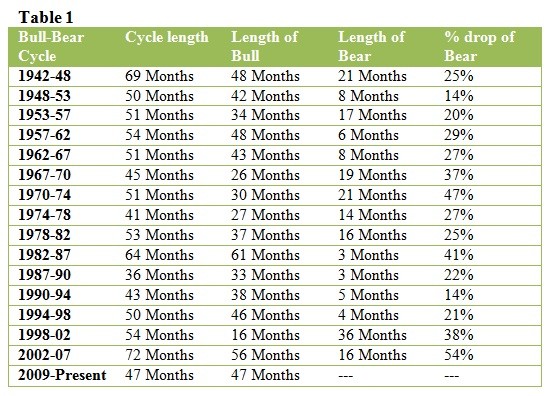The Beginning of a Bear Market_5
Post on: 6 Сентябрь, 2015 No Comment

Are equities experiencing an overdue correction or the start of a bear market? That’s what many investors are wondering after U.S. stocks recently posted their worst three-day streak since 2011. Russ weighs in.
Monday, Friday and Thursday marked the worst three-day streak for U.S. stocks since 2011.
As of Monday’s close, the S&P 500 was down roughly 6.5% year-to-date, while the broader global MSCI ACWI Index was down around 9% in dollar terms. Meanwhile, other segments of the market are already in correction territory (down 10% or more year-to-date).
Emerging markets were off 10% at the lows, U.S. small caps down 13% and energy stocks lost more than 18%, as measured by the MSCI Emerging Markets Index, the Russell 2000 Index and the S&P Global Energy Index respectively.
Even with equities rebounding on Tuesday, the events over the past week beg the question: Are equities experiencing an overdue correction or the start of a bear market.
My take is that absent a geopolitical shock, we’re experiencing what’s likely to be a painful correction. but not the start of something nastier, like a prolonged period of sustained selling. Here are two reasons why.
1. Valuations aren’t cheap, but they’re nowhere close to bubble territory. The MSCI World Index of developed markets is trading at 17x trailing earnings, while the MSCI Emerging Markets Index trades at around 12.5x. Both valuations are roughly 15% below their 20-year average. Markets also look reasonable, although not cheap, on a price-to-book basis. Finally, valuations should arguably be a bit above average given both low inflation and low interest rates, both of which support margins and valuations. None of this suggests that stocks can’t go down further, but it does imply that valuations alone are unlikely to be the catalyst for a bear market.
2. Neither the U.S. nor the global economy appears on the cusp of another recession . While valuations have been much higher in the past, bears would be right to point out that markets peaked at around current valuation levels in 2008. Why should stocks be safe now? The reason is that while the global economy is slowing, it’s not yet stalling. For example, today U.S. new orders are comfortably in expansion territory and leading indicators are positive. In contrast, in 2008, most indicators suggested that U.S. manufacturing was already contracting and leading indicators had been falling for more than a year. Even global indicators, such as global PMI and Services PMI data, are still comfortably in positive territory.
Are equities experiencing an overdue correction or the start of a bear market? That’s what many investors are wondering after U.S. stocks recently posted their worst three-day streak since 2011. Russ weighs in.
Monday, Friday and Thursday marked the worst three-day streak for U.S. stocks since 2011.
As of Monday’s close, the S&P 500 was down roughly 6.5% year-to-date, while the broader global MSCI ACWI Index was down around 9% in dollar terms. Meanwhile, other segments of the market are already in correction territory (down 10% or more year-to-date).
Emerging markets were off 10% at the lows, U.S. small caps down 13% and energy stocks lost more than 18%, as measured by the MSCI Emerging Markets Index, the Russell 2000 Index and the S&P Global Energy Index respectively.
Even with equities rebounding on Tuesday, the events over the past week beg the question: Are equities experiencing an overdue correction or the start of a bear market.
My take is that absent a geopolitical shock, we’re experiencing what’s likely to be a painful correction. but not the start of something nastier, like a prolonged period of sustained selling. Here are two reasons why.
1. Valuations aren’t cheap, but they’re nowhere close to bubble territory. The MSCI World Index of developed markets is trading at 17x trailing earnings, while the MSCI Emerging Markets Index trades at around 12.5x. Both valuations are roughly 15% below their 20-year average. Markets also look reasonable, although not cheap, on a price-to-book basis. Finally, valuations should arguably be a bit above average given both low inflation and low interest rates, both of which support margins and valuations. None of this suggests that stocks can’t go down further, but it does imply that valuations alone are unlikely to be the catalyst for a bear market.
2. Neither the U.S. nor the global economy appears on the cusp of another recession . While valuations have been much higher in the past, bears would be right to point out that markets peaked at around current valuation levels in 2008. Why should stocks be safe now? The reason is that while the global economy is slowing, it’s not yet stalling. For example, today U.S. new orders are comfortably in expansion territory and leading indicators are positive. In contrast, in 2008, most indicators suggested that U.S. manufacturing was already contracting and leading indicators had been falling for more than a year. Even global indicators, such as global PMI and Services PMI data, are still comfortably in positive territory.

What could go wrong? First, the global economy is slowing. Given the tepid pace of the recovery, a global shock, whether in the form of a worsening Ebola outbreak or a spike in oil, could knock the economy back into a recession. Thankfully oil prices are going down, and this should further cushion growth.
Another possibility is that an adverse reaction to Federal Reserve (Fed) tightening could rattle markets. But here again, the risks are likely overstated. The Fed is unlikely to hike interest rates before next spring, and slowing economic growth may push the initial data further into 2015. Plus, even when the Fed does start to hike, given the fragile nature of the recovery and still low inflation, the central bank will take its time.
So what should investors take away from the recent bout of volatility?
- More volatility. As I’ve been warning for some time, this period of unusually quiet markets is coming to an end. Investors should expect elevated volatility going forward .
- Favor market segments offering relative value. I continue to advocate that investors place a greater emphasis on relative value than on momentum.
- More modest stock market gains. As I’ve mentioned on several occasions recently, while I believe that stocks still look reasonable and can move higher this year. stretched valuations suggest more volatility ahead and a slower pace of gains during the remainder of the year than experienced during the unusually buoyant markets of 2012 and 2013.
Sources: BlackRock research, Bloomberg
Russ Koesterich, CFA, is the Chief Investment Strategist for BlackRock and iShares Chief Global Investment Strategist. He is a regular contributor to The Blog and you can find more of his posts here .
This material represents an assessment of the market environment at a specific time and is not intended to be a forecast of future events or a guarantee of future results. This information should not be relied upon by the reader as research or investment advice regarding the funds or any security in particular.
2014 BlackRock, Inc. All rights reserved. iSHARES and BLACKROCK are registered trademarks of BlackRock, Inc. or its subsidiaries. All other marks are the property of their respective owners.














